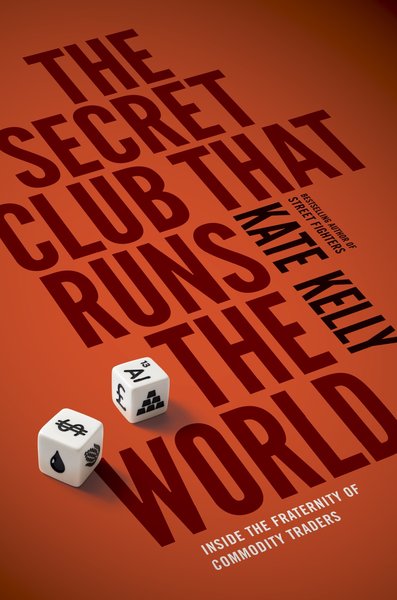 This is a very good book; I learned a lot as I read it, and you will too.
This is a very good book; I learned a lot as I read it, and you will too.
In this book, Kate Kelly takes on the economic sector?of commodities. ?This involves production, distribution, trading, hedging, and ultimate use.
There are many players trying to profit in many different ways. ?There are hedge funds, commodity trading advisers, investment banks, producers, refiners. ?Some do just one facet of the commodities sector; some do everything.
This book is replete with stories from the run-up in commodity prices, and all of the games that went on. ? It tells of those who made a lot of money, and those that want ?broke working in a very volatile part of the economy.
It is a book that gives a testimony that information is king, and those that understand future supply, demand, and transportation costs can make a great deal of money by buying cheap, transporting, and selling high.
That said, the math can get overly precise versus the real world… the book gives examples of hedging programs that were too clever by half, ending in disaster when prices moved too aggressively.
With hedging, simplicity is beauty. ?But after some success in trading well, companies think that instead of hedging, let trading become a profit center of its own . ?Far from reducing risk, risks rise beyond measure, until the scheme blows up.
The book also considers non-market players like politicians and regulators, and how they are almost always a few steps behind those they regulate. ?A key theme of the book is whether market participants can manipulate prices or not. ?I would invite all market participants to consider my writings on penny stocks. ?Can the price be manipulated? ?Yes. ?For how long? ?Maybe a month or two at best. ?In bigger markets like commodities, I?suspect the ability to manipulate prices is less, because there are more players trading, and the power is equal between buyers and sellers. ?There are powerful parties on both sides seeking their advantage.
The Glencore/Xtsrata merger and Delta Airlines hedging program/buying a refinery occupy a decent amount of the book. ?Glencore/Xstrata illustrates the desire for scale and control in owning production in trading assets in commodities. ?Delta Airlines illustrates the difficulties involve in being a heavy energy user in a cyclical, capital-intensive business that carries a lot of debt. ?It’s too early to tell whether owning their own oil refining operation was the right decision or not, though typically companies do better to specialize, rather than vertically integrate.
One you have read this book, you will have a good top-level view of how the commodities sector operates, and thus I recommend the book.
Quibbles
The book title is vastly overstated. ?There is no secret. ?Just becuse many people don’t know about them doesn’t mean they are secret. ?There is adequate data about them if you look.
There is no club. ?Yes, some move from one position in one firm to a position in another. ?Some even become regulators. ?That is common to most industries.
They don’t run the world. ?At most, they have a weak hold over commodities markets, because the traders have better data on global supply and demand than most large producers and consumers do. ?That information allows them to profit on spreads, but it doesn’t let them move markets.
Summary
Given my quibbles, I thought it was a great book. ?A marketing guy probably wrote the title, so I give the author a pass on that. ?If you want a readable high-level view of the commodities markets, you can get it in this book. ?If you want to, you can buy it here:?The Secret Club That Runs the World: Inside the Fraternity of Commodity Traders.
Full disclosure: The PR flack asked me if I would like a copy and I said “yes.”
If you enter Amazon through my site, and you buy anything, I get a small commission.? This is my main source of blog revenue.? I prefer this to a ?tip jar? because I want you to get something you want, rather than merely giving me a tip.? Book reviews take time, particularly with the reading, which most book reviewers don?t do in full, and I typically do. (When I don?t, I mention that I scanned the book.? Also, I never use the data that the PR flacks send out.)
Most people buying at Amazon do not enter via a referring website.? Thus Amazon builds an extra 1-3% into the prices to all buyers to compensate for the commissions given to the minority that come through referring sites.? Whether you buy at Amazon directly or enter via my site, your prices don?t change.

2 thoughts on “Book Review: The Secret Club that Runs the World”